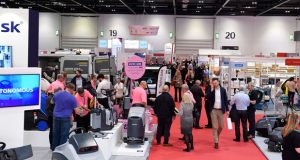Chris Edwards, Facilities Show Event Director, outlines how smart technology is making an impact on cleaning and FM provision
The office environment is changing with new concepts springing up all the time in terms of workspace design, such as slides down to different floors, treehouses for meetings and velvet sofas and beanbags in breakout areas. Now smart technology is helping to improve workplaces even further.
A decade ago, the idea of controlling your home’s heating, lights and security systems remotely may have seemed like science fiction to many. Now, with technology such as Google Home, Alexa and Hive products, we are becoming familiar with the concept of smart homes and connecting devices via a central hub.
Naturally, this technology is also increasingly being used to create efficiencies in the workplace, albeit on a much greater scale for large office blocks, universities and hotels. Essentially a smart building is one in which energy and operational systems are controlled and regulated automatically – or with minimal human intervention – to provide comfortable, efficient, high-performance working environments.
Staff in a smart building benefit from meeting rooms with localised air conditioning controls, access control passes that also allow you to buy lunch or earn rewards and a building that allows you to work as easily from the café as your desk. They are far less likely to enjoy heading off to a building where the last one out has to turn the lights off.
 New ways to manage facilities
New ways to manage facilities
The bottom line is that this information can give the cleaning and FM sector a much clearer picture of what’s happening in their building. For example, a retailer could use the data generated by an existing security system to measure footfall and building usage, supplementing existing sources of information, and enabling them to better direct cleaning services.
Data from access control systems could be used to help reduce power or energy consumption too. If a room is unoccupied, it won’t require the same level of heating or lighting as other rooms, which would make a big difference in a multi-storey office block.
Intelligent use of data is also helping facilities managers more effectively maintain buildings, moving them away from a reactive model of asset maintenance towards a genuinely proactive approach. New technologies, along with remote monitoring and analytics, can now help organisations progress to an intelligent situation, whereby they can know in advance when a piece of technology service equipment is going to fail or deteriorate, and proactively manage the issue before it happens. This not only reduces expense, but also avoids the extensive delays in responding and fixing the problem, during which time the asset is out of action.
Wellbeing
It also shouldn’t be underestimated how smart buildings can impact on wellbeing. An organisation whose building provides light, space, healthy catering and relaxation areas, is more likely to be seen as one that cares for its people. This breeds commitment and dedication from employees, as well making a positive difference to their mental health. Better engineering can provide buildings with cleaner, fresher air and internal temperatures that react to users’ and the overall environment.
From an asset perspective, if facilities managers, landlords and boards start to show a commitment to these areas, they will enjoy the inevitable benefits that come with making property produce this kind of data. Improving energy management and space efficiency are two outcomes that are hard to avoid once you understand exactly how your building is being used. But it all starts and ends with a genuine focus on technology improving the lives of the workforce.
 The Smart Buildings Expo is a new area set to inspire over 12,000 global cleaning and FM professionals attending Facilities Show 2019. Experience, educate and consult are the main themes of the Smart Buildings Expo. An interactive, life-size replica of a smart office is a stand-out feature. Created in partnership with Master Systems Integrators Vanti, this 196m² area enables visitors to experience first-hand how interconnected technologies can make buildings more intelligent and, ultimately, improve performance.
The Smart Buildings Expo is a new area set to inspire over 12,000 global cleaning and FM professionals attending Facilities Show 2019. Experience, educate and consult are the main themes of the Smart Buildings Expo. An interactive, life-size replica of a smart office is a stand-out feature. Created in partnership with Master Systems Integrators Vanti, this 196m² area enables visitors to experience first-hand how interconnected technologies can make buildings more intelligent and, ultimately, improve performance.
For more information visit Facilities Show 2019 and register for your free ticket here.





